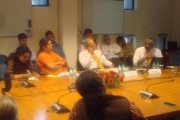NCAER organised a conversation with Professor Hari K. Nagarajan, RBI Chair Professor at IRMA, about the findings of his joint work with Hans P. Binswanger-Mkhize and Anirudh Tagat on whether democratisation and devolution of responsibilities to local governments in India improves access to health care, health status, and individual incomes.
Using nationally representative household panel data for rural India from NCAER’s Rural Economic and Demographic Surveys (more popularly known as REDS), the authors explore the welfare effects of the choice of health service provider. They find that the deepening of democracy through participation in local decision-making and improved grievance redressal related to public goods influences the choice of health care provider. Given a level of illness, they find that such choice, in turn, leads to increases in contribution to household incomes that vary by gender. Their work importantly implies that it is not only the supply of services and mechanisms of access that are important, but what also matters is the extent to which members of households are able to participate in the management and governance of these services. This work continues earlier work based on the REDS data, the only national panel data for rural India, by Nagarajan, Binswanger and Meenakshisundaram in their book, Decentralization and Empowerment for Rural Development, published by NCAER and Cambridge University Press in 2015.
In his presentation at NCAER, Professor Nagarajan gave an overview of the study, the data and explained the methodology used. While talking about the result, he spoke on the combined impact of local governance and on why governance matters. He stressed on the need for care expenditures, and greater access to publicly-managed health services. “Policy should therefore focus both on strengthening direct accountability of health care providers to citizens and indirect accountability via democracy. The structure, design, and management of the health care system in rural India is crucial for economic welfare of households’’, he added. The findings of the study show that increasing accountability in health via democratic citizen participation in the Panchayat government is a powerful means to improve the rural public health care system in India and results in reduced probability of falling ill and reduced private health
Hari K. Nagarajan is Professor and RBI Chair in Rural Economics at IRMA in Anand. Prior to this he was a Senior Fellow at NCAER, where he headed the team that collected and analysed the last round of the REDS data. He has also been a consultant to IFAD, the World Bank, and SEBI. His research interests include rural development, land markets, land reforms, inheritance, and price formation in agricultural markets. He has published in professional economic journals including the European Economic Review, Journal of Human Resources, Journal of Development Studies, World Development, Agricultural Economics, and Economic and Political Weekly. He has taught at the Indian Institute of Management, Bangalore and at the University of Oklahoma, Norman. Nagarajan holds a PhD in economics from the University of Oklahoma, Norman.






